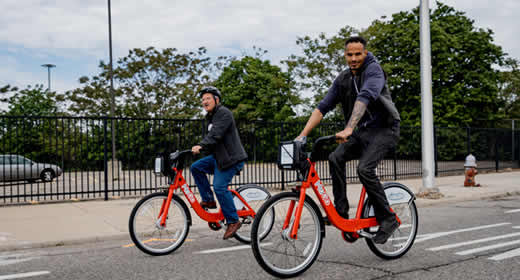
During a single week in late May, more than 4,000 bike riders took to the streets of Detroit as the first users of MoGo, the city’s new bike share program.
By now, the bright red/orange bikes are a frequent sight throughout the city, where locals and visitors can take out bikes at 43 stations spread around 10 neighborhoods. But MoGo’s early success comes after years of careful planning by LISA NUSZKOWSKI (MPP ‘03), who began to develop the program while she worked at Wayne State University’s Office of Economic Development.
Initially, the idea for a Detroit bike share came from engaged community members who approached the university, says Nuszkowski. To get the program off the ground, she and her team at WSU conducted a feasibility study, which explored the logistics of a bike share program in the Motor City, including fundraising, business models, and implementation challenges.
“Early on, the feasibility study really provided us some solid ground to stand on because there was a lot of early skepticism about whether this could work in Detroit,” she says. “Having a study that was done that looked at all of the challenges and opportunities and strengths and weaknesses we could possibly encounter related to a bike share helped us create some credibility about what we were doing.”
Plans to launch Detroit’s bike share system developed just as the City of Detroit prepared to declare municipal bankruptcy, which meant that it wasn’t feasible for it to be a city-owned project, says Nuszkowski. So in 2015, the project found a home at the Downtown Detroit Partnership (DDP). And today, Nuszkowski serves as the founder and executive director of MoGo Detroit Bike Share, a nonprofit affiliate of the DDP.
With nonprofit status, the organization was able to team up with the City of Detroit to secure its first grant, an award of over $1 million from the federal government, which was crucial to early growth. Since then, the organization has raised more than $4 million from a range of stakeholders, including title sponsors (Henry Ford Health System and Health Alliance Plan), private foundations (including the Kresge, Hudson-Weber, and Knight Foundations), and corporations (including Blue Cross Blue Shield of Michigan and General Motors).
“Getting that first money in the door really helped to validate what we were doing, and then allowed us to raise the additional money [from other sectors] that we needed to launch and then operate the system, says Nuszkowski. “Funding certainly played an interesting role in bringing people together.”
During the planning phase, Nuszkowski says her team adopted a learning approach, centered on incorporating best practices and avoiding mistakes made by other city bike share programs, and spent months soliciting the input of both community members and city experts. One of the team’s guiding questions was how to plan a bike share program with community members, “as opposed to planning for and then presenting plans to the community after decisions had already been made,” Nuszkowski says.
To inform the planning process, MoGo hosted community meetings and launched a web-based platform for additional bike station-siting suggestions from those who couldn’t attend. Then, when initial plans for stations and pricing were available, they hosted additional meetings to validate the plan and to avoid what Nuszkowski describes as “one and done conversations.”
Of her team’s outreach approach, Nuszkowski says they continually expanded who was invited to provide feedback, reaching out to additional neighborhoods, businesses, and organizations beyond the groups invited to participate in the initial feasibility study.
The organization then worked with several levels of government throughout the permitting process, from the Detroit Department of Public Works to the Michigan Department of Transportation. Nuszkowski suggests that anyone working on a service-delivery project set aside significant time for permitting.
“It was quite a process. There’s no better way to learn about some of the inner workings of city government than going through the permitting process,” she says. “Basically if you do anything, it requires a permit.”
On the operations side, Nuszkowski’s organization partnered with ShiftTransit, a company with extensive experience deploying and running bike share systems in other cities. The company hires Detroit residents to maintain the bikes and to provide customer service to riders.
Beyond conversations about ridership size and revenue, Nuszkowski considers meeting equity and inclusion goals integral to a successful MoGo program, which means working to build a diverse base of riders in terms of age, ability, ethnicity, and more.
“Detroit still has a relatively high poverty level and we wanted to be very sensitive that the pricing structure was not unattainable for people here,” she says. “A mark of success for us is if the types of people who are using the system are reflective of the people that live and work and spend time in the city.”
To ensure MoGo is accessible to riders of different income levels, the fee structure includes a $5 annual pass for individuals who receive state benefits like Medicaid or food stamps, and enables cash payments for rides.
Going forward, Detroit Bike Share also aims to improve the mobility experience for people across Detroit, which includes both adding bikes for riders with disabilities and advocating for city infrastructure improvements like protected bike lanes.
“This is about bike share, but it’s also about something bigger,” Nuszkowski says. “It’s about how do we create a more livable community?”
--Story by Afton Branche (MPP '17) and Jacqueline Mullen (MPP '18)